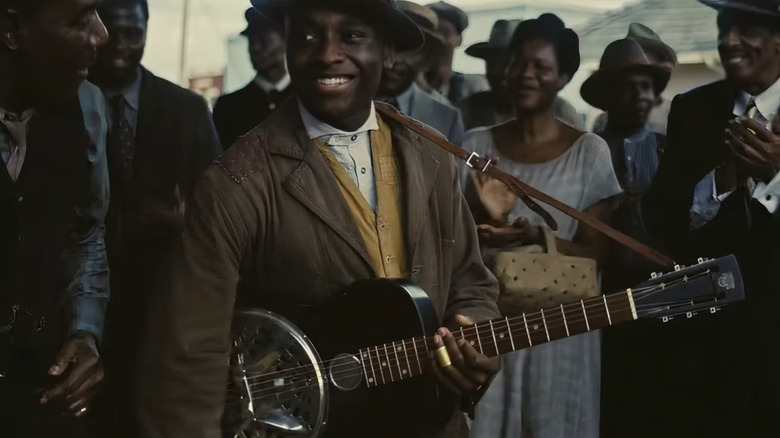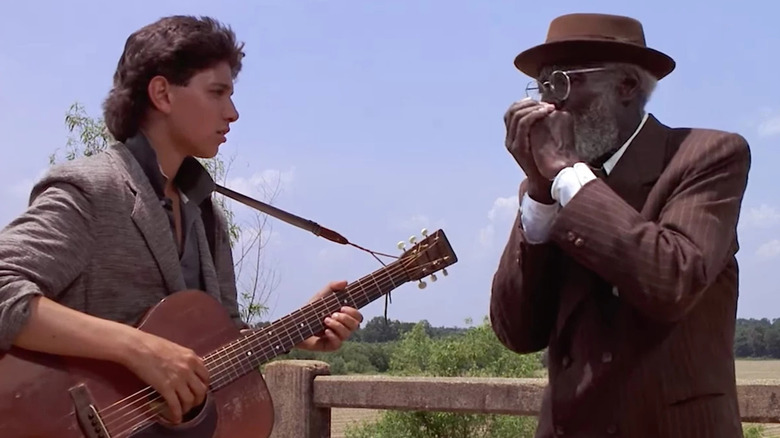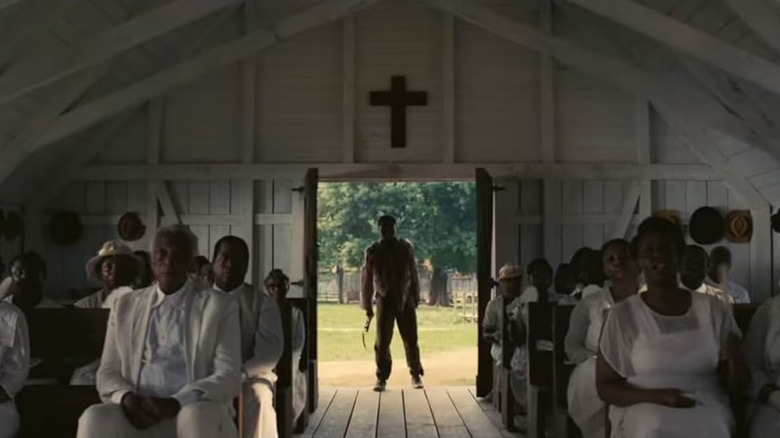The Music Mythology Of Sinners Has A Long And Fascinating History
This article contains spoilers for "Sinners."
Think about this question long and hard: What would you be willing to sacrifice in order to achieve greatness? As our society descends into a neverending cycle of narcissism and self-promotion thanks to the reign of social media, it feels like the majority of people wouldn't think twice about sacrificing their dignity, thoughts, or time to achieve fame and/or fortune. Yet greatness is something more than mere popularity or notoriety; it also involves a sincere desire to master the craft. One of the most frustrating things about achieving greatness is that talent and hard work are only half the battle, because you need a lot of luck, too. If some supernatural force approached you and made you a deal where your greatness could be guaranteed in exchange for your soul, would you take the deal, or find yourself battling the temptation toward darkness within and without you?
These are the questions posed by one of the oldest and most compelling legends in music mythology: the story about Delta bluesman Robert Leroy Johnson. According to the legend, the young Johnson took his guitar and left his Mississippi plantation one night to go to a crossroad; some say it was near the Dockery Plantation, others attribute it to different locations. In any case, this crossroad was supposedly where Johnson met some form of the Devil (perhaps the Christian figure of Satan, or the trickster god Legba from African mythos) and made a Faustian bargain with him. Allegedly, the Devil took Johnson's guitar, tuned it, played it, and returned it, affording Johnson mastery of the instrument in exchange for his soul. Thus, so the legend goes, the blues were born.
This legend, or some form of it, has been told and retold countless times. In fact, the legend wasn't even first attributed to Robert Johnson, but rather Tommy Johnson, an unrelated blues musician who was active a good decade prior. Whatever the reality, the legend continues, and a version of it can be seen most recently in Ryan Coogler's film "Sinners." Coogler's movie is a lot of things — a period drama, a treatise on the power of art, a vampire horror film — yet it also uses the Johnson legend in a fascinating new way, continuing a mythos surrounding the blues and music in general with aplomb.
The pop cultural appearances of the Johnson crossroads legend
The story of Robert Johnson meeting the devil at the crossroads functions as a way to lend the birth of blues music some weight, as well as help explain how Johnson was able to master the guitar so well so quickly (other than, you know, his pure talent). And, as "The Man Who Shot Liberty Valance" makes plain, there's more power in printing the legend than the truth. That's why, despite decades' worth of varying accounts, the tale of a musician meeting the devil and either gaining some ability or dispelling the demon after a music battle has continued to thrive in pop culture.
In addition to references to the myth cropping up in various blues tunes here and there (most notably in Robert Johnson's own song, "Crossroad"), the 1979 hit "The Devil Went Down to Georgia" by the Charlie Daniels Band is arguably the most famous "devil battle" song. That tune is followed closely by Tenacious D's "Tribute," a comedy-rock number which cheekily references the myth, and was subsequently dramatized in the song's music video and the film "Tenacious D in The Pick of Destiny." In addition to the legend itself, Tenacious D's Jack Black and Kyle Gass may have also been influenced by the Canadian sketch comedy troupe The Kids in the Hall, whose September 25th, 1990 episode featured a sketch where a teen rock n' roller character guitar battled the devil.
As the myth later expanded to include other genres of music, and further connected the story to its roots in older myth and literature, namely Goethe's "Faust." Thus, in films like the rock n' roll parable "Phantom of the Paradise" and the disco freak-out "The Apple," the devil (or an explicit surrogate) is present. Yet there have been movies and television that continue to connect the "devil and music" trope to the blues legends, such as "O Brother, Where Art Thou?" which features Tommy Johnson, and a second-season episode of "Supernatural," in which Robert Johnson plays a part. One film which explicitly embraces Robert Johnson and his legend is 1986's "Crossroads," written by John Fusco and directed by Walter Hill. In it, a young white aspiring blues musician and a man revealed to be Johnson's friend Willie Brown head down to where the film claims the infamous crossroad is to save Willie's soul. The film seems to have influenced Coogler's "Sinners," particularly in the way it transitions from a drama into a supernatural parable, as well as how both movies involve key cultural elements (like a hoodoo mojo bag) and an emphasis on musical sequences.
How Sinners references and remixes the Johnson legend
Coogler never explicitly references the mythological crossroad, nor is Johnson referred to by name, but one who is mentioned repeatedly is a blues musician who acted as a mentor to both Johnsons, Willie Brown, and others: Charley Patton. Patton considered to be the father of the Delta blues (a title corroborated by music journalist Robert Palmer), and in the film, aspiring musician Preacherboy Sammie (Miles Caton) is in possession of a resonator guitar that Elias "Stack" Moore (Michael B. Jordan) claims was once Patton's. The guitar is revealed to have actually belonged to the twins' abusive father, but Sammie imbues the instrument with respect and his own talent. Combined with the guitar's use as a defense against the vampires, this continues the film's theme of sinfulness being inexorably tied together with goodness.
Where the Johnson myth really becomes evoked lies in Coogler's mythology created for the movie, which states that throughout time, there have existed people whose music is so pure that they can pierce the veil between past, present, and future, allowing the spirits of those who have been and who have yet to be to find themselves conjured during a performance. It's an ability that can create community but also attract evil ... like a group of nomadic vampires. Sammie is one of these people, and his talent is thus seen as both a blessing and a curse. Throughout the film, Sammie's preacher father, Jedidiah (played by poet and rapper Saul Williams), attempts to get his son to renounce his musical ambitions, telling him, "If you keep dancing with the devil, he's gonna follow you home." Sammie, who does not stop playing the blues or get rid of his uncle's guitar, goes on to become a famous musician (played by real-life blues legend Buddy Guy), only to find that a couple of vampires have tracked him down over the decades.
Although the vampires don't kill old man Sammie, they make an offer to turn him, an offer which is similar to the one that vampire leader Remmick (Jack O'Connell) made when Sammie was young. It's a Faustian bargain, one which other characters in the film make. Sammie never makes that bargain, but Coogler seems to indicate that being an artist is a Faustian bargain all its own. "Sinners" posits that art is a reflection of the individual, their culture, and their community, and thus it's neither wholly good nor evil. Like Smoke and Stack, like the vampires and the humans, the relationship between art and artist is a mercurial one, with the two sides of each coin needing to find balance rather than mere eradication.
As Sammie learns and Robert Johnson allegedly discovered, a person can do a sinful thing for good reasons and vice versa, and the devil is all around us on a daily basis, so sometimes a deal must be made.


